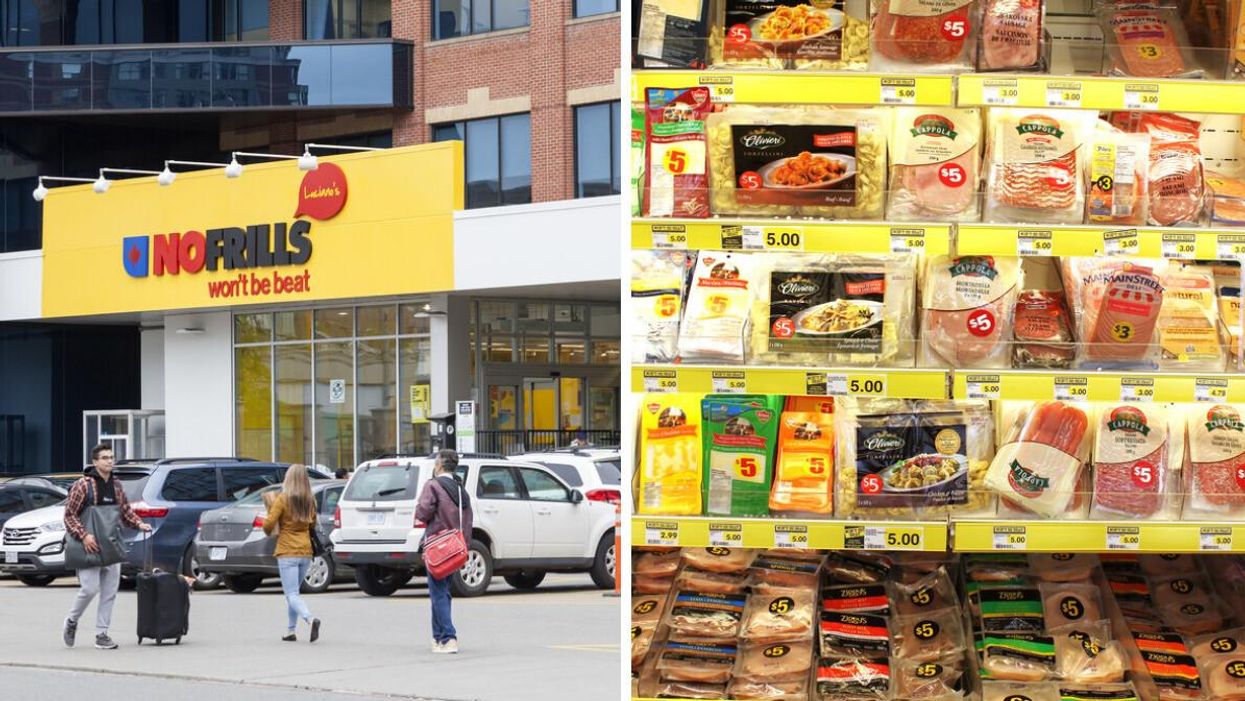Food Prices in Canada Are Going Up In 2023 & Here's How Much More You'll Have To Spend
These items are going to get more expensive.👇

A No Frills grocery store. Right: A shelf at a grocery store.
Anyone who has been to a store in Canada over the last year knows that grocery prices are through the roof right now.
And, according to a new report, food prices are only going to go further up next year.
Canada's Food Price Report 2023 is predicting a 5% to 7% increase in food prices in 2023.
The report, which is the result of a collaboration between Dalhousie University, the University of Guelph, the University of Saskatchewan, and the University of British Columbia, predicts that the average family of four will spend up to $16,288.41 on groceries for the full year.
That is an increase of up to $1,065.60 from 2022!
New Report Says Food Costs Are Expected To Rise For Canadians In 2023 #shortswww.youtube.com
That also means that an adult between the age of 19 and 30 could expect to pay between $3813.88 and $4380.18 in total for food in 2023.
That being said, you can expect the cost of some food items to increase more than others.
One of the items that will see the biggest increase in price is vegetables. That's right, your greens are predicted to go up by 6% to 8% next year.
After that, bakery, dairy and meat products are expected to increase by 5% to 7%. Seafood and restaurant bills could rise by 4% to 6%.
Fruit prices are also increasing but will have a more moderate bump of 3% to 5% in 2023.
The study cites climate change, supply change disruptions, carbon taxes, geopolitical climates and rising transportation costs as some of the factors behind the increasing cost of groceries.
Other factors that come into play include the war in Ukraine and more local issues, such as labour shortages in Canada.
According to Statistics Canada, 20% of Canadians have reported that their households are very or somewhat likely to use the service of food banks over the next few months due to rising prices.
Meanwhile, 47% of Canadians said they've had to change their spending habits to cope with grocery store inflation, including buying cheaper alternatives and brands.
If you're wondering how you can get the most bang for your buck as we go into the new year, here are some ways to save money on groceries in Canada, according to an expert.
This article's cover image was used for illustrative purposes only.
- The Feds Are Investigating 'Greedflation' In Canadian Grocery Stores & Here's What That Means ›
- The Feds Are Finally Investigating Grocery Store Prices in Canada & They Want Your Take ›
- I Went Grocery Shopping At Loblaws For 9 Everday Basics & Prices Are Still Out Of Control - Narcity ›
- Someone In Northern Ontario Showed What A $40 Grocery Run Looks Like & It's Not Much - Narcity ›
- People In Vancouver Are Sharing How Much Food Items Cost Now & Cauliflower Is 'Outrageous' - Narcity ›
- Someone Found A $33 Pack Of Chicken At No Frills In Alberta & People Are Going Off (PHOTO) - Narcity ›
- TikTokers Are Calling Out Soaring Egg Prices In The US & Here's What's Causing The Issue - Narcity ›
- 11 Products You Can Find At Costco In Canada That Are Cheaper Than At Grocery Stores - Narcity ›
- TikTokers Are Getting Riled Up About The Price Of Chips In BC & The 'Absolute Robbery' - Narcity ›
- A New Report Reveals How Grocery Prices In Canada Can Get Cheaper & Where People Shop The Most - Narcity ›
- 8 Ways Grocery Shopping In Canada Is So Different From Dubai & Yes, Prices Are The Big One - Narcity ›